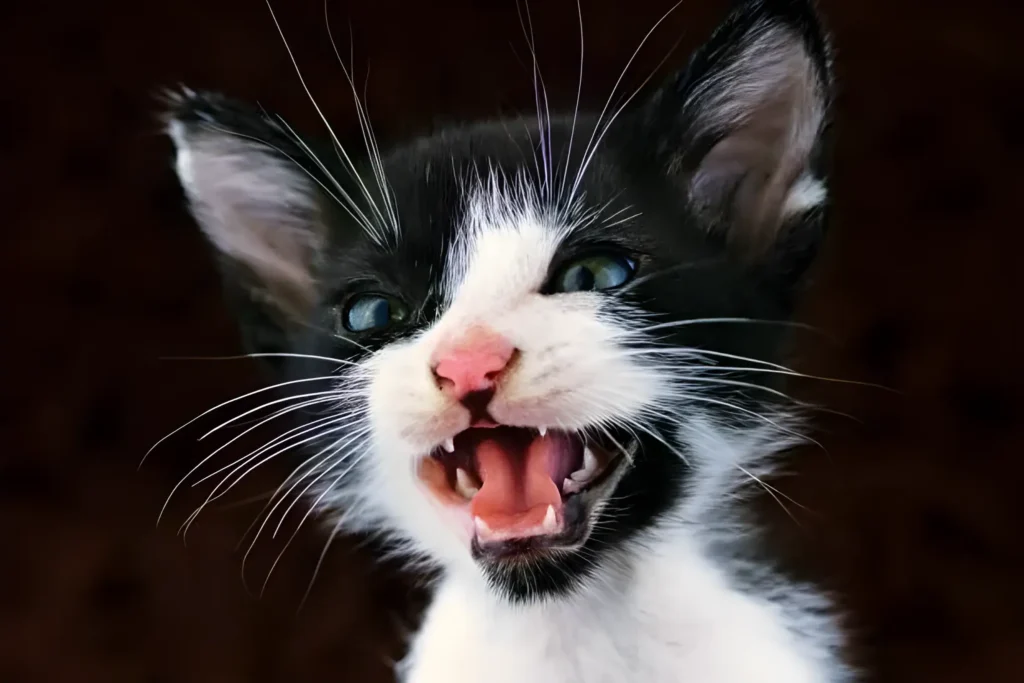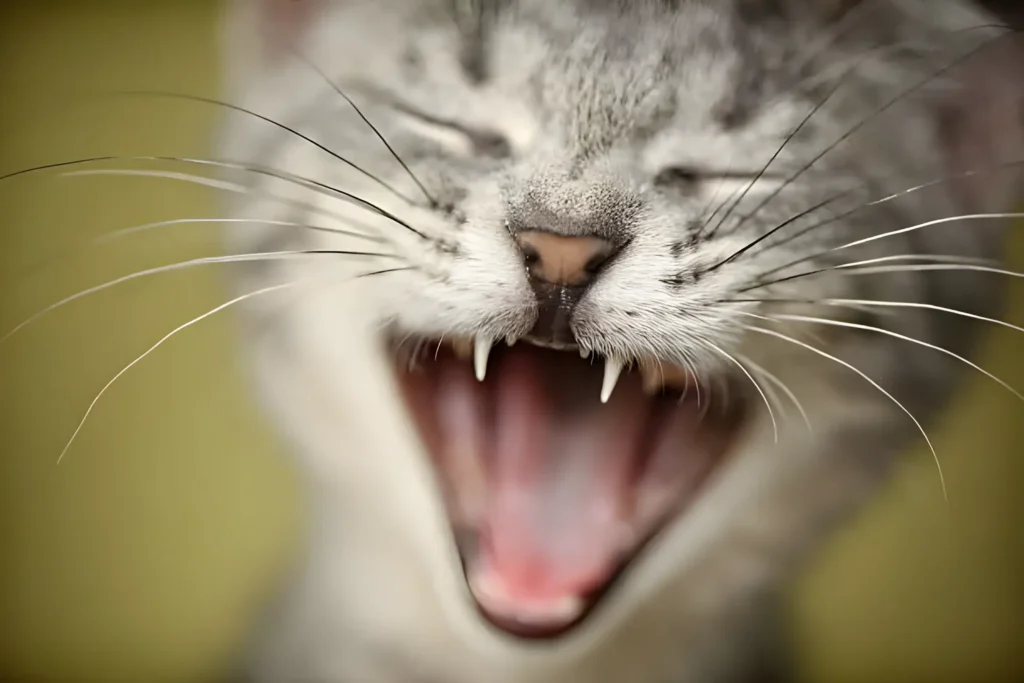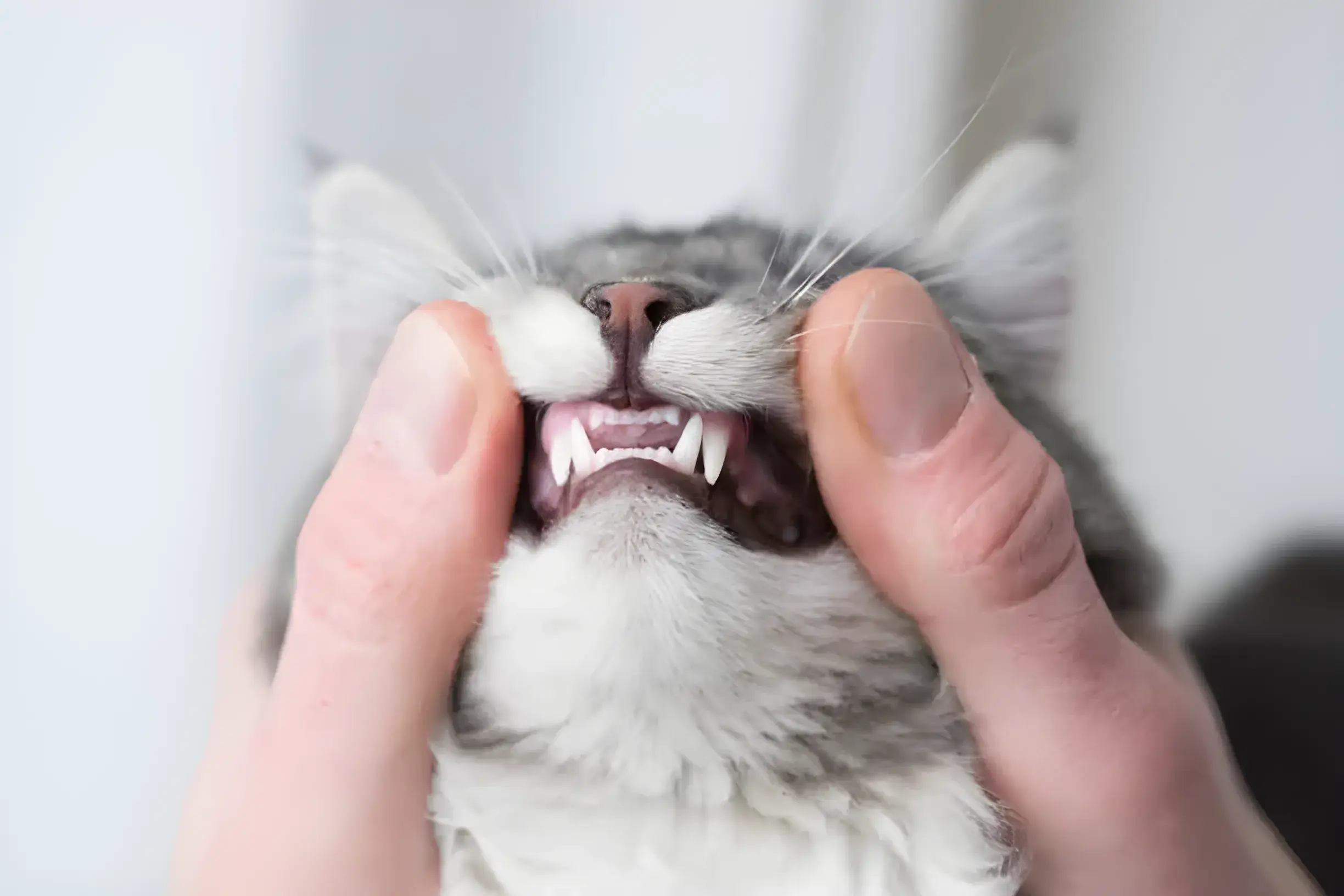Your kitten is likely to start teething between 2 -4 weeks of age. This process can involve mild discomfort, so it’s important to understand the timeline and how to help your furry friend feel better.
Understanding Your Kitten’s Teething Timeline
Kittens go through two phases of teeth development, just like human babies:
Baby Teeth (Deciduous Teeth):
- 2-4 Weeks: Incisors (tiny front teeth) erupt
- 3-4 Weeks: Canines (the long, pointy ones) appear
- 4-6 Weeks: Premolars (behind the canines) come in
Replacing Baby Teeth:
- 3 1/2 – 4 Months: Baby incisors start falling out, adult incisors grow
- 4-5 Months: Baby canines and premolars fall out, adult versions start to erupt
- 5-7 Months: All 30 adult teeth should be in place, including molars
Kitten Teething Chart
| Tooth Type | Approximate Eruption Age (Baby Teeth) | Approximate Age for Adult Tooth Eruption |
|---|---|---|
| Incisors (tiny front teeth) | 2-4 weeks | 3 1/2 – 4 months |
| Canines (long, pointy teeth) | 3-4 weeks | 4-5 months |
| Premolars (behind the canines) | 4-6 weeks | 4-5 months |
| Molars (back teeth, adult only) | N/A | 5-7 months |
Please Note: These timeframes are approximate. Some kittens may teethe slightly earlier or later.
Why Teething is Important (and Sometimes Uncomfortable)
Sets the Stage for Adult Teeth: Kitten teething paves the way for strong, healthy adult teeth essential for eating and overall well-being.
Gum Soreness: Just like teething babies, kittens can experience gum discomfort as their teeth push through.
Behavioral Changes: Increased chewing, crankiness, and a slight decrease in appetite are common during teething.
Helping Your Teething Kitten: Relief Strategies
Safe Chew Toys: Provide a variety of textures (soft, rubbery, crinkly). Consider toys you can refrigerate or freeze for extra gum relief. Examples: Look for fun and durable options like chilly teething rings, textured rubber toys, and crinkle toys. You can even introduce soft finger toothbrushes to get them used to having their mouth handled.
Cold Washcloth: Offer a damp, chilled washcloth to chew on.
Frozen Treats: Frozen kibble pieces or kitten-safe, low-sugar popsicles can be soothing.
Veterinarian Visit: If a baby tooth hangs on too long or you notice bleeding/swelling gums, consult your vet.
Making Your Home “Kitten-Proof” During Teething

Out of Reach: Hide electrical cords, houseplants, and dangling items that seem appealing to chew on.
Positive Redirection: When you catch your kitten chewing on something inappropriate, gently guide them towards an approved chew toy.
Signs Your Kitten is Teething
While teething is a natural process, it can be helpful to recognize the signs your kitten is experiencing this developmental stage. Look out for:
Chewing on Everything in Sight: This is a classic sign of teething kittens. They’ll explore their mouths with anything they can find, including furniture, toys, and even your fingers!
Mild Drooling: Some drooling is normal during teething, but excessive drooling could indicate another issue.
Pawing at Their Mouth: Kittens may paw at their mouth to try and soothe any discomfort in their gums.
Being Slightly More Vocal or Restless: Teething kittens might be fussier or meow more than usual. They may also seem a bit restless due to the discomfort in their mouths.
Red, Slightly Swollen Gums: The gums around erupting teeth may appear slightly red and swollen. This is usually temporary and shouldn’t be a cause for concern unless it’s severe.
Complications to Watch For
While teething is a normal process, there are a few potential complications to keep an eye out for. If you notice any of these signs, consult your veterinarian:
Retained Baby Teeth: Occasionally, a baby tooth might not fall out naturally, even after the adult tooth has started to erupt. This can cause overcrowding or misalignment of the adult teeth.
Bleeding or Infected Gums: Bleeding or infected gums are uncommon but can occur during teething. Signs might include excessive redness, swelling, or pus around the gums.
Misaligned Teeth: In some cases, teething problems can lead to misaligned adult teeth. While not always a major concern, your vet will monitor this during routine checkups.
Dental Toy Recommendations

Providing your teething kitten with safe and engaging chew toys is crucial. Here are some specific recommendations to consider:
Chilly Teething Rings: These rubber toys can be chilled or frozen to provide soothing relief for sore gums.
Textured Rubber Toys: Look for toys with a variety of nubs, bumps, and ridges to massage the gums and help clean off soft plaque.
Crinkle Toys: Cats love the satisfying crinkling sound, and the soft fabric provides another texture to chew on.
Soft Finger Toothbrushes: Great for both teething relief and getting your kitten used to having their mouth handled for eventual toothbrushing.
Kitten Dental Care: Building Good Habits
Though young kittens don’t need full-fledged toothbrushing, it’s incredibly wise to start introducing good mouth care habits early. Gently rub their gums with your finger (wrapped in a soft cloth works too!) to get them accustomed to the sensation. This prepares the way for introducing a pet-friendly toothbrush later on.
Conclusion
Teething is a normal, yet sometimes uncomfortable, part of growing up for kittens. By understanding what they’re going through, offering a bit of extra patience, and providing safe ways to soothe their gums, you’ll help your furry friend sail through this developmental milestone.
The photo featured below the post headline is Credit: Nils Jacobi/istockphoto
I hope you find this post helpful and informative. If Yes’ feel free to share it with your friends!
Frequently Asked Question
How long does kitten teething last?
The most active teething phase is usually over by 6 months, when their adult teeth are in place. However, some kittens may start teething as early as 2 weeks and continue to experience some discomfort until all their adult teeth are in.
Do kittens lose their appetite when teething?
A minor decrease in appetite is possible due to gum soreness. However, significant refusal to eat could signal a problem unrelated to teething. Consult your vet if you’re concerned.
Is it normal for kittens to drool when teething?
Some drooling can happen, but excessive drooling might warrant a vet check to rule out other issues.
How do I know if my kitten is teething or just playing?
Teething kittens will often target objects they normally wouldn’t chew on, like furniture legs or your fingers. Their chewing might also seem more insistent and focused than playful nibbling.
Can I give my teething kitten human pain relief medication?
Absolutely not! Human pain medications can be toxic to cats. Always consult your veterinarian before giving your kitten any medication.
My kitten’s breath smells bad. Is this related to teething?
While some mild changes in breath odor are possible during teething, persistent bad breath could indicate a dental issue or other health concern. Have your vet check your kitten’s mouth.
Should I let my kitten chew on my fingers during teething?
It’s best to discourage this. While it may seem cute initially, it can lead to painful biting habits as your kitten grows older. Redirect them to appropriate chew toys.
Is there anything I can put on my kitten’s gums to help with teething pain?
Avoid using any numbing gels or creams designed for humans. Consult your veterinarian as they may recommend a pet-safe product if needed.
Do kittens get fevers when teething?
Teething itself does not generally cause fever in kittens. If your kitten is running a fever, it’s important to consult your vet as this could indicate an infection.
My kitten seems extra grumpy while teething. Is this normal?
Yes, some kittens become fussier or more irritable during teething due to the discomfort. Offer plenty of patience and soothing options like chilled toys.
How do kittens act when they are teething?
Beyond chewing on everything, teething kittens may paw at their mouth, be more vocal or restless, drool slightly, or have a reduced appetite.
How do you soothe a teething kitten?
Safe chew toys (especially chilled ones), frozen treats, a cold washcloth to chew on, and gentle gum massage can provide relief.

